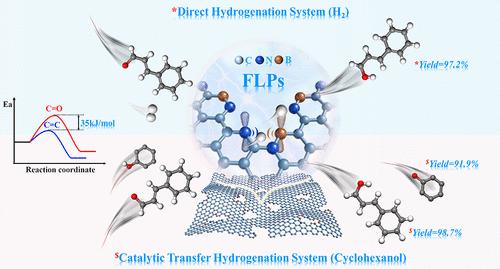B, N共掺杂缺陷还原氧化石墨烯作为α,β-不饱和醛选择性加氢制备不饱和醇的高效受挫刘易斯对催化剂
IF 15.6
1区 化学
Q1 CHEMISTRY, MULTIDISCIPLINARY
引用次数: 0
摘要
开发具有优异活性和稳定性的全固态无金属挫折刘易斯对(FLPs)加氢催化剂仍然是一个重大挑战。本文采用在还原氧化石墨烯表面制备碳缺陷和杂原子掺杂的方法制备了B、N共掺杂FLPs催化剂(De-rGO-NxBy),并将其应用于α、β-不饱和醛选择性加氢制备不饱和醇。研究发现,以双氰胺和代谢酸为N源和B源,在还原氧化石墨烯表面可以构建富电子的吡啶-N (Lewis碱)和相邻的缺电子的B -N (Lewis酸)位点,从而形成FLPs位点。更重要的是,构建的碳缺陷可以促进吡啶- n / B-N FLPs位点的形成,从而提高催化加氢活性和对不饱和醇的选择性。此外,原位漂移和DFT计算表明,吡啶- n / B-N FLPs位点可以有效地激活醛和H2分子的C = O, H-H键的离解能仅为0.53 eV。该催化剂在以环己醇及其衍生物为氢源的转移加氢反应中表现出优异的催化性能。本研究为全固态FLPs无金属催化剂的设计和制备提供了新的思路,促进了不饱和醇的绿色合成。本文章由计算机程序翻译,如有差异,请以英文原文为准。

B, N Codoped Defective Reduced Graphene Oxide as a Highly Efficient Frustrated Lewis Pairs Catalyst for the Selective Hydrogenation of α,β-Unsaturated Aldehydes to Unsaturated Alcohols
The development of all-solid-state frustrated Lewis pairs (FLPs) metal-free hydrogenation catalysts with excellent activity and stability remains a significant challenge. In this work, B, N codoped FLPs catalysts (De-rGO-NxBy) were prepared by the strategy of fabricating carbon defects and heteroatom doping on the surface of reduced graphene oxide and applied in the selective hydrogenation of α,β-unsaturated aldehydes to unsaturated alcohols. It was found that electron-rich pyridine-N (Lewis base) and adjacent electron-deficient B–N (Lewis acid) sites could be constructed on the surface of reduced graphene oxide using dicyandiamide and metaboric acid as N and B sources, thus forming FLPs sites. More importantly, the constructed carbon defects could facilitate the formation of pyridinic-N/B–N FLPs sites, thereby improving the catalytic hydrogenation activity and the selectivity to unsaturated alcohols. Furthermore, in situ DRIFTS and DFT calculations show that the pyridinic-N/B–N FLPs sites can efficiently activate the C═O of aldehydes and H2 molecules with only 0.53 eV dissociation energy of the H–H bond. Also, the catalyst presents excellent catalytic performance in the transfer hydrogenation reactions with cyclohexanol and its derivatives as hydrogen sources. This study provides new ideas for the design and preparation of all-solid-state FLPs metal-free catalysts and promotes the green synthesis of unsaturated alcohols.
求助全文
通过发布文献求助,成功后即可免费获取论文全文。
去求助
来源期刊
CiteScore
24.40
自引率
6.00%
发文量
2398
审稿时长
1.6 months
期刊介绍:
The flagship journal of the American Chemical Society, known as the Journal of the American Chemical Society (JACS), has been a prestigious publication since its establishment in 1879. It holds a preeminent position in the field of chemistry and related interdisciplinary sciences. JACS is committed to disseminating cutting-edge research papers, covering a wide range of topics, and encompasses approximately 19,000 pages of Articles, Communications, and Perspectives annually. With a weekly publication frequency, JACS plays a vital role in advancing the field of chemistry by providing essential research.

 求助内容:
求助内容: 应助结果提醒方式:
应助结果提醒方式:


